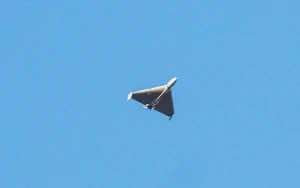
Border blockades: Truth and cynicism
The issue of Polish truckers blocking checkpoints on the Ukrainian-Polish border is escalating. Organizers have announced the addition of the Shehyni checkpoint to the already blocked Yahodyn, Rava-Ruska, and Krakowiec checkpoints. This move effectively blocks all major transport routes from Poland to Ukraine
As of Monday, 1,200 trucks queued up in Yahodyn, with an equal number in Rava-Ruska, and "only" 500 in Krakow. Ukrainian drivers face up to a two-week wait to cross the border, and if not resolved soon, this wait could extend even further. The Polish-Ukrainian border is essentially closed for road freight transport. Slovak carriers have also joined in a "precautionary" blockade. If their demands are not met by the Slovak government, they plan to permanently block checkpoints.
This situation is a significant blow for Ukraine as it heavily relies on land routes for the supply of weapons, humanitarian aid, and overall economic activities. Despite assurances from Polish organizers, the blockade prevents the passage of military cargo and trucks carrying humanitarian assistance.
The political cynicism formula
Protesters from Poland have laid out a range of demands. They aim to:
- Revoke the European Union's decision from March 2022 for unrestricted entry into the EU transport market.
- Reinstate permits for transportation between Poland and Ukraine, with a distribution of 60% for Polish carriers and 40% for Ukrainian ones (as of February 24, 2022).
- Halt the validity of licenses for transport companies established in Poland after February 24 of the previous year (mostly owned by Ukrainian citizens).
- Scrap the electronic queue system for empty trucks from Poland leaving Ukraine.
- Include trucks from Polish companies carrying goods in the "Shlyah" system to significantly speed up border crossings.
The Ukrainian government is addressing the matter through negotiations with blockade organizers, engaging Polish government representatives in dialogue, preparing lawsuits to compensate Ukrainian carriers' losses, and providing assistance to Ukrainian drivers facing hardships.
The European Commission has cautioned Poland about potential fines for violating European laws if the blockade persists.
Talks between representatives from the Ukrainian Ministry of Infrastructure and the protestors concluded without an agreement. This was due to the Ukrainian state being unable to meet the protestors' demands and the Polish authorities seemingly supporting the protestors. Recently, Polish Minister of Infrastructure Andrzej Adamczyk pointed fingers at Ukraine and the European Union for the protest. He attributed it to the revocation of licenses for Ukrainian carriers in the EU, “putting Polish carriers at a disadvantage.”
Adamczyk stated that the Polish government "upholds democratic principles," allowing protests while refraining from interfering.
This reflects a mix of political populism and cynicism at its peak. It appears that neither the law nor the EU decision, endorsed by the Polish government, particularly the Minister of Infrastructure, holds significance. The focus seems to be on the interests of the political party and creating challenges for the new government, which will be formed by the current opposition.
A hen that lays golden eggs
Commencing in early November, the organizers of this protest recognized the start of a transitional period in Poland. While the Law and Justice (PiS) party secured the top spot in the elections, it lacks the ability to establish a new government. Four opposition parties signed a coalition agreement and elected the leadership of the two chambers of parliament, the Sejm and the Senate.
Despite these developments and the selection of Donald Tusk as the coalition's prime ministerial nominee, President Andrzej Duda designated Mateusz Morawiecki from PiS to lead the government. However, it's improbable that he will secure a vote of confidence in parliament. Tusk is expected to assume the role of the new prime minister, likely in the first half of December.
The transport blockade organizers expected the "old" government to give in due to its desperate bid to cling to power. They miscalculated, as PiS knows Morawiecki’s mission is bound to fail. PiS leaders have prioritized extending their time in power and complicating the start of Tusk's government, especially in strained relations with Ukraine, deepened by PiS and President Duda over the past six months.
The cynicism of the Polish-Ukrainian border blockade is heightened by the fact that in the first three quarters of 2023, Polish exports to Ukraine rose by 25%, totaling a 3% overall increase. Ukraine now ranks 8th among countries receiving Polish exports. Despite this, Poland's economy is predicted to grow by only 0.4-0.6% this year, indicating economic stagnation.
One might think it's unwise to kill a hen that lays golden eggs and to harm a lucrative relationship. Avoiding actions that hurt exports could prevent a further dip in already low economic growth. However, such logic eludes Polish protesters and their government, focused on their own interests in the political struggle.
The decision might take a month
The protesters and the "old" government aren't concerned about the war in Ukraine and our people's desperate struggle against Russia – the enemy that openly declares plans to attack Poland after conquering Ukraine.
Is there a way out? Yes, but it might take another month until a new government is formed. This is too much time, and Ukraine doesn’t have it.
We must work with public opinion in Ukraine, Poland, and all of Europe, exposing the baselessness and cynicism of the blockade. Negotiations with the Polish government and the European Commission should continue. Our government needs to engage the parliaments of both states; relying solely on good personal relations between Volodymyr Zelenskyy and Andrzej Duda leads nowhere.
We should acknowledge that truth and law are on our side. Therefore, persistence is key in defending our interests and supporting the drivers crucial for our existence and victory.
About the author. Mykola Knyazhytskyi, journalist, Member of the Ukrainian Parliament
The editors do not always share the opinions expressed by the blog authors
- News














































